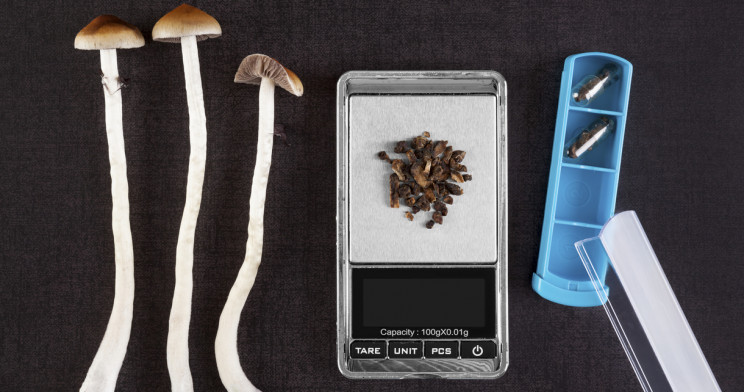Landmark Study Shows That Single Dose of Psychedelic Drug Psilocybin Produced Antianxiety and Antidepressant Effects That Last for Years
Source: Thailand Medical news Jan 28, 2020 5 years, 2 months, 4 weeks, 1 day, 8 hours, 4 minutes ago
Researchers from New York University Grossman School of Medicine, following up on their landmark 2016 study, found that a one-time, single-dose treatment of
psilocybin, a compound found in psychedelic mushrooms, combined with psychotherapy appears to be associated with significant improvements in emotional and existential distress in
cancer patients. These effects persisted nearly five years after the drug was administered.

The initial study, published in the
Journal of Psychopharmacology, showed that
psilocybin produced immediate, substantial, and sustained improvements in
anxiety and
depression and led to decreases in
cancer-related demoralization and hopelessness, improved spiritual well-being, and increased quality of life. At the final 6.5-month follow-up assessment,
psilocybin was associated with enduring
antianxiety and
antidepressant effects. Approximately 60 percent to 80 percent of participants continued with clinically significant reductions in
depression or
anxiety, sustained benefits in existential distress and quality of life, as well as improved attitudes toward death.
The current study, published in the same journal, is a long-term follow-up (with assessments at about 3 years and 4.5 years following single-dose
psilocybin administration) of a subset of participants from the original trial. The study reports on sustained reductions in
anxiety,
depression, hopelessness, demoralization, and death anxiety at both follow-up points.
About 60 percent to 80 percent of participants met the criteria for clinically significant
antidepressant or anxiolytic responses at the 4.5-year follow-up. Participants overwhelmingly (71 to 100 percent) attributed positive life changes to the
psilocybin-assisted therapy experience and rated it among the most personally meaningful and spiritually significant experiences of their lives.
The 2016 parent study’s lead investigator, Dr Stephen Ross, MD, an Associate Professor of Psychiatry in the Department of Psychiatry at NYU Langone Health told
Thailand Medical News, “Adding to evidence dating back as early as the 1950s, our findings strongly suggest that
psilocybin therapy is a promising means of improving the emotional, psychological, and spiritual well-being of patients with life-threatening
cancer. This approach has the potential to produce a paradigm shift in the psychological and existential care of patients with
cancer, especially those with terminal illness.”
There is an urgent need for an alternative means of treating
cancer-related
anxiety and
depression, says Dr Ross. According to statistics from several sources, close to 40 percent of the global population will be diagnosed with
cancer in their lifetime, with a third of those individuals developing
anxiety,
;depression, and other forms of distress as a result. These conditions, experts say, are associated with poorer quality of life, increased rates of suicide, and lowered survival rate. Unfortunately, conventional pharmacologic treatment methods like antidepressants work for less than half of cancer patients and tend to not work any better than placebos. In addition, they have no effect whatsoever on existential distress and death anxiety, which commonly accompany a cancer diagnosis and are linked to a hastened desire for death and increased suicidality, says Dr Ross.
The medical researchers say psilocybin may provide a useful tool for enhancing the effectiveness of psychotherapy and ultimately relieving these symptoms. Although the precise mechanisms are not fully understood, experts believe that the drug can make the brain more flexible and receptive to new ideas and thought patterns. In addition, previous research indicates that the drug targets a network of the brain, the default mode network, which becomes activated when we engage in self-reflection and mind wandering, and which helps to create our sense of self and sense of coherent narrative identity. In patients with anxiety and depression, this network becomes hyperactive and is associated with rumination, worry, and rigid thinking. Psilocybin appears to acutely shift activity in this network and helps people to take a more broadened perspective on their behaviors and lives.
In the initial study, the NYU Langone team provided 29 cancer patients with nine psychotherapy sessions, as well a single dose of either psilocybin or an active placebo, niacin, which can produce a physical flush sensation that mimics a psychedelic drug experience. After seven weeks, all participants swapped treatments and were monitored with clinical outcome measures for anxiety, depression, and existential distress, among other factors.
Though researchers found that the treatment’s antianxiety and antidepressant qualities persisted 6.5 months after the intervention, little was known of the drug’s effectiveness in the long term. The new follow-up study is the longest-spanning exploration of psilocybin’s effects on cancer-related psychiatric distress to date, the study authors say.
Dr Gabby Agin-Liebes, Ph.D. candidate, lead investigator and lead author of the long-term follow-up study, and co-author of the 2016 parent study added, “These results may shed light on how the positive effects of a single dose of psilocybin persist for so long. The drug seems to facilitate a deep, meaningful experience that stays with a person and can fundamentally change his or her mindset and outlook.”
Dr Agin-Liebes, who is pursuing her Ph.D. in clinical psychology at Palo Alto University in California, cautions that psilocybin does not inherently lead to positive therapeutic effects when used in isolation, and in uncontrolled, recreational settings, and “should be taken in a controlled and psychologically safe setting, preferably in conjunction with counseling from trained mental health practitioners or facilitators,” she adds.
The researchers plan to expand this research with larger trials in patients from diverse socioeconomic and ethnic groups who have advanced cancer-related psychiatric and existential distress.
Dr Ross added, “This could profoundly transform the psycho-oncologic care of patients with cancer, and importantly could be used in hospice settings to help terminally ill cancer patients approach death with improved emotional and spiritual well-being,”
Reference : Long-term follow-up of psilocybin-assisted psychotherapy for psychiatric and existential distress in patients with life-threatening cancer
Gabrielle I Agin-Liebes, Tara Malone, Matthew M Yalch, .Stephen Ross et al., Journal of Psychopharmacology, First Published January 9, 2020 https://doi.org/10.1177/0269881119897615
Initial Study : https://doi.org/10.1177/0269881116675512
